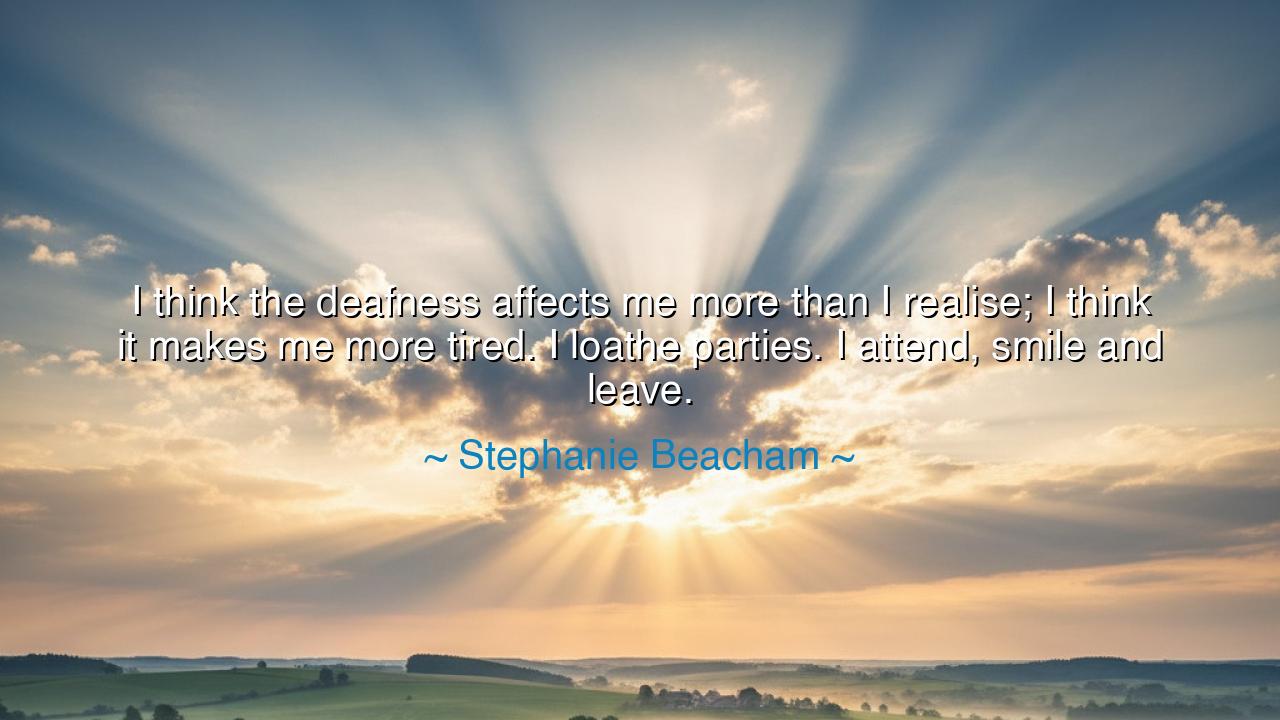
I think the deafness affects me more than I realise; I think it
I think the deafness affects me more than I realise; I think it makes me more tired. I loathe parties. I attend, smile and leave.






Stephanie Beacham, with honesty that pierces through the glitter of public life, once confessed: “I think the deafness affects me more than I realise; I think it makes me more tired. I loathe parties. I attend, smile, and leave.” In these words lies the quiet sorrow of one who walks among crowds yet feels apart from them, who wears the mask of grace yet carries the unseen weight of fatigue. She unveils a truth that many know but few dare speak—that there are burdens invisible to the eye, and that the effort to appear whole can itself be exhausting.
The ancients knew such struggles well. They spoke often of the burdens the body places upon the soul, and how the spirit must adapt. Homer sang of warriors scarred and maimed, yet still striving to prove their worth among men. The philosopher Epictetus, himself crippled, taught that though the body may be broken, the will remains sovereign. So too does Beacham show us that her deafness, though not seen by others, shapes her very presence in the world. To endure conversation in a hall of laughter and music is not joy, but labor. Thus, her simple act of attending a party, offering her smile, and then retreating, is not cowardice but a form of courage.
Consider the tale of Helen Keller, born into silence and darkness. Though she was cut off from both sound and sight, she became a voice for millions. Yet even she admitted that the constant struggle to communicate was exhausting, and that her smile often concealed the toll it took. Like Beacham, she bore herself with dignity, but behind that dignity was endless effort. Their stories remind us that what looks effortless in others may in truth be a battle waged each moment.
Beacham’s dislike of parties is no mere distaste for noise or frivolity. It is the recognition that what others receive with ease—a simple conversation, a shared laugh—requires for her a draining exertion. To remain gracious, to smile, and to depart quietly is her way of maintaining dignity without surrendering entirely to weariness. It is an act of self-preservation, and also a silent protest against a world that often mistakes social gatherings for the measure of happiness.
Mark this well: the smile she describes is not the false mask of hypocrisy, but the shield of courtesy. She offers it as a gift to the world, even when she herself feels distant or tired. This is the paradox of many who suffer silently—they give more than they receive, they endure more than they reveal. To smile under strain is not weakness, but strength disguised in gentleness.
Practical wisdom flows from her words. We must learn to look beyond appearances, to recognize that the person who leaves early, who seems aloof or weary, may in truth be carrying an invisible burden. Offer compassion rather than judgment, patience rather than reproach. And if you yourself bear such burdens, take courage from Beacham’s example: there is no shame in setting boundaries, in offering what you can and withdrawing when you must. To smile and leave is better than to break yourself for the sake of appearances.
Therefore, O seeker, take Stephanie Beacham’s confession as a teaching. Life will bring you unseen trials, and others will not always understand the toll they take. Yet even then, you can choose dignity, offering light where you are able and withdrawing when the shadows grow too heavy. In the end, it is not the length of time you endure the party, but the truth and strength with which you endure life, that defines your worth. And if you can still raise a smile in the midst of fatigue, then you have already triumphed.






AAdministratorAdministrator
Welcome, honored guests. Please leave a comment, we will respond soon